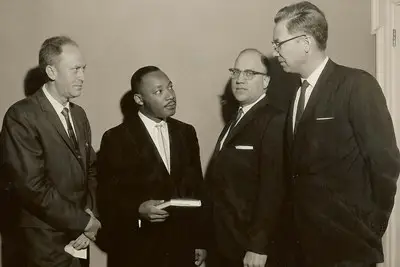
Changing a Nation
By 1961 the nation had been in the troughs of the civil rights struggle for six years. In truth, the nation had struggled with civil rights since its founding, but the 1955 Montgomery Bus Boycott started an unprecedented chapter in this on-going struggle.
On April 19, 1961, Martin Luther King stood behind the pulpit in Alumni Chapel of Southern Baptist Theological Seminary in Louisville, Kentucky, to deliver the J.B. Gay Lectures on Christian Ethics. Southern Seminary was the oldest and most prestigious seminary sponsored by the Southern Baptist Convention. Much of King’s work the past six years had been centered in places where Southern Baptists formed the largest religious group. It is an understatement to say many Baptists were not pleased with him.
King’s appearance caused a stir among some at the seminary. A few dignitaries invited by other seminary departments to participate in the lecture series withdrew after hearing of King’s participation. But the faculty and administration would not back down. They stood with Henlee Barnett, the seminary’s most distinguished Christian ethicist, who had nominated King for the lectureship.
So on April 19, the nation’s leading civil rights advocate stood to address the leaders of Southern Baptists’ most distinguished educational institution at a time when tensions about civil rights were about to erupt across the nation and especially in the South.
“Segregation is a moral evil which no Christian can accept. The church must make it clear that if we are to be true witnesses of Jesus Christ, we can no longer give our allegiance to a system of segregation.”
He called segregation more than a political issue. It was a moral issue, he said. “Since the church has a moral responsibility of being the moral guardian of society, then it cannot evade its responsibility in this very tense period…” he declared.
Listen to the audio tape of that address and you will hear previews of themes made famous in King’s “I Have a Dream” speech on the Capitol Mall in August 1963. You will hear King utter that famous line “Let justice roll down like a river, righteousness like a never-failing stream.” The quote is from Amos 5:24, a fact King acknowledged in his seminary address.
In 1961 and, more famously, in 1963 King used the Bible to lay the foundation for his moral crusade against segregation and Jim Crow laws. He fought for the Voting Rights Act based on the Bible’s teaching that in Christ there is no Jew nor Gentile, slave nor free, male or female (Galatians 3:28). For the Apostle Paul, that teaching was so important he made the same point again in Colossians 3:11.
King crusaded in behalf of the poor, the hungry, the disposed of, because that is what Jesus followers do. Christians demonstrate their Lord’s compassion through such acts and they offer a hand up by working for a society that cares for “the least of these.”
King’s appearance at Southern Seminary created a firestorm for the seminary.
Baptist bodies passed resolutions condemning the school for inviting King whom many labeled a trouble maker. Some stopped supporting Southern Seminary through the Cooperative Program – the primary financial support channel of the denomination. Donors canceled pledges. One church wrote Barnett, who initiated the King invitation, attacking him with such viciousness that Barnett looked up the church’s Cooperative Program giving and calculated the amount of money that eventually found its way to Southern Seminary. He then figured what portion of that money went toward his salary. With that information, he sent the church the amount of their money that went toward his salary – four cents.
Today Southern Baptist seminaries teach that King is a “Christian Hero” according to a January 18, 2019 press release from Baptist Press, a news outlet for Southern Baptists. The release quoted Jason Duesing, provost for Midwestern Baptist Theological Seminary in Kansas City, saying, “I classify him (King) as one of seven chief theologians in the Baptist tradition.”
Leroy Gainey, who teaches education leadership at Gateway Seminary in California, said, “At least during my lifetime, there is no greater Christian or Baptist leader that I can see than Martin Luther King.”
It takes the eyes of history to see how the appraisal of Martin Luther King by Baptists in the South has changed over the years. And history shows that some once prominent leaders who used tortured reasoning and twisted theology to oppose equality and civil rights for all have faded into oblivion.
What has not changed is the church’s commission to be “the moral conscience of the nation” as King said in 1961. That is what Jesus followers do. They demonstrate God’s compassion for all and they work for a society that does the same.
Every time one prays the Lord’s Prayer, every time we say “thy will be done on earth as it is in heaven” we affirm that mission. The prayer is not for “pie in the sky by and by.” It is for now.
King unapologetically used Bible teachings to influence national policies and to change a nation. So should we.
Dr. Bobby S. (Bob) Terry serves as an Advisor to the President of Samford University for Faith Networks. A native of Alabama, Dr. Terry holds degrees from Mississippi College and Southern Baptist Theological Seminary. He was involved in state Baptist papers for more than 50 years beginning in 1968 and retiring at the end of 2018 from The Alabama Baptist newspaper after serving for more than 23 years as it’s President and Editor.
Follow him on Twitter at @drbobterry.
To contact Bob Terry, email [email protected].
Featured image from SBTS.edu.

